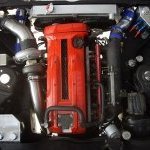Power....when Do You Think Its Enough?
Announcements
-
Similar Content
-
Latest Posts
-
The spray cans were in the "Kiln" room whilst I was preping the parts, so probably around 2 hours to get them warmed up, the kiln room has 3 small ovens running at 100°c, 3 medium sized ovens running 100°c, and the large one I used running at 80°c, the room itself was about 28°c, I also spent a bit of time taping up the parts in the room as well, and by the time I was done I would assume that the parts were around that 28°c As for power, I expect a couple of Killerwasps up high would be achievable with the current mods, I'm still running the MZR 2.0 intake and throttle body, and there is a slight mismatch with the 2.0 intake (smaller) and 2.5 intake ports (larger) on the head, this intake is matched and specifically designed to fix this issue with the ports mismatch, the throttle body is also a couple of mm larger, OEM is 65mm, the Bosch is 68mm In the end it will look "prettier" than the molded plastic thing that is the OEM MZR 2.0 intake As for the LSD, it's the OEM Torsen which works fine for what I use the car for, plus, basically no maintenance apart from the occasional oil change
-
I was at Tunehouse in Marrickville (great team over there really know their VR's) , and I spotted this Very clean R35.
-
Mate , I have the same issue right now with the exhaust noise , if you can tell me what your local guy did , I'll talk to my guys and see if they can do the same. Power is good but it just too loud when put it down.
-
The other trick I've found with wrinkle black is to put the can in hot water for a bit to warm the paint up, and to pre-heat whatever you're painting. It'll be interesting to see if you pick up any power with the intake, following with interest. Got a proper lsd for this?







Recommended Posts
Create an account or sign in to comment
You need to be a member in order to leave a comment
Create an account
Sign up for a new account in our community. It's easy!
Register a new accountSign in
Already have an account? Sign in here.
Sign In Now